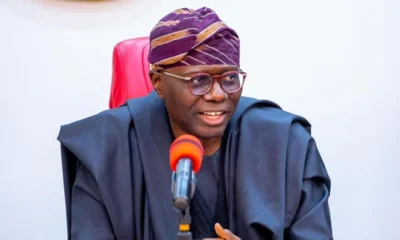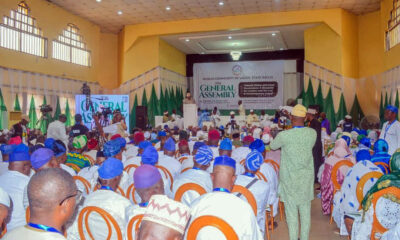Education
Be agents of positive change, Lagos first lady urges students

By Dada Jackson
All environment-related clubs in all schools in Lagos State on Wednesday came under one umbrella known as Environmental Bees Club, with the First Lady, Ibijoke Sanwo Olu, at the launch, charging the students to become agents of positive change of the environment.
The First Lady, who spoke at the Adeyemi Bero Auditorium, Alausa, added that there was a need for sustainable environmental education with the involvement of the younger generation (students).
She explained that this could only serve as a panacea to the yearnings for a greener environment through attitudinal and self monitoring approach.
Dr Sanwo-Olu stressed that nowadays, the environment had more issues with humanity’s footprints almost everywhere with changes in the natural world having greater consequences such as climate change, famine, pollution of all forms, indiscriminate dumping of refuse which stares us in the face daily.
She said, “With the formal launch, students who are the hope of the future are adequately updated and equipped with the skills and information to transform the environment into a greener one for the benefits of all.”
She described the launch which also featured the unveiling of an EBC training manual as a brilliant collaborative initiative aimed at tackling environmental challenges that promotes a sustainable environment.
Speaking earlier, the chief host, Commissioner for the Environment and Water Resources, Tunji Bello, said making the young ones environment champions heralded a new approach to environmental management.
Bello said the launch of the club was a milestone made possible by the support of Mr Governor and his wife, adding that it marked a new dimension to complete eradication of all environmental nuisances that stare all in the face and achievable through the practical demonstration of actions required while involving the children in ecosystem value sustainability.
He recalled that the original concept started as Schools Environmental Advocacy Programme and took off in Y2005 during the tenure of Governor Bola Tinubu with the New Era Foundation as its main facilitator with the objective of inculcating sound environmental practices in the minds of students so that they can serve as a vehicle of change to the larger society.
He stressed that the club in years past ensured students were exposed to practical knowledge in matters relating to global environmental issues and best environmental practices employed by international communities to reduce effects of environmental degradations through exchanged visits to Germany.
Bello went down memory Lane that at inception, the club was known as Green Hands Club which later metamorphosed into Climate Change club (CCC), working with other environmental clubs introduced by various organizations in schools with different aims and objectives.
He said government deemed it fit to harmonise all the clubs hence the change of the name of the club to Environmental Bees Club (EBC).
“It is in the light of this that the ministry is desirous of harmonizing all the environment based clubs in schools and henceforth rebrand them; we are also launching a non-examinable standardized training manual for use in schools by already trained club handlers with adequate knowledge on trending environmental issues,” Bello reiterated.
He said the environmental education was geared towards developing a populace that is aware and concerned about the environment and its associated problems; adding that those equipped through training would seek remedies to environmental problems and prevent the new ones.
In her remarks, the Permanent Secretary, Office of Environmental Services, Mrs Belinda Odeneye, said that the care for the environment could be achieved through knowledge acquisition, attitudinal change and development of individuals capable of taking actions on environmental issues towards achieving a sustainable environment.
She said alot could be manufactured from non bio- degradable materials such as plastics, nylon, used tyres and this can be achieved through recycling as well as reusing.
The Environmental Bees Club and Training Manual for Handlers of the club was later offically unveiled by the First Lady, assisted by the Wife of the Deputy Governor, the Commissioner for the Environment and Water Resources and other dignitaries.
Awards were also presented students and pupils who distinguished themselves in the essay competition and to various environmental ambassadors.
Education
Reasons Behind UniAbuja’s Expulsion of 28 Students, Withdrawal of 15 Certificates

Reasons Behind UniAbuja’s Expulsion of 28 Students, Withdrawal of 15 Certificates
The University of Abuja (UniAbuja), now renamed Yakubu Gowon University, has expelled 28 students and revoked certificates of 15 graduates following findings of serious academic and disciplinary violations.
The decision was made at the 191st Regular Meeting of the University Senate held on Thursday, January 28, 2026, after reviewing reports and recommendations from the Student Disciplinary Committee (SDC).
Reasons for Expulsion and Certificate Withdrawal
According to a statement signed by Dr. Habib Yakoob, Acting Director of Information and University Relations, the students were found guilty of offences including threats to life, physical assault, examination malpractice, conspiracy, burglary, theft, cult-related activities, possession and use of hard drugs, and falsification of O’Level results submitted during admission. Some students also failed to appear before the committee despite repeated invitations.
The 15 graduates had their certificates withdrawn for similar non-compliance, rendering their credentials null and void. Meanwhile, nine students were cleared after investigations, and 33 others received formal warnings for infractions including conspiracy, hostel racketeering, and fighting.
READ ALSO:
- Yoruba Muslim Group Dismisses Viral Ramadan Date Claim, Reaffirms Sultan of Sokoto’s Authority
- FCT Council polls: APC Wins Four Chairmanship Seats as PDP Takes Gwagwalada
- Dangote Opens Refinery Investment to Nigerians With Public Share Sale Plans
University’s Commitment to Discipline
The Vice-Chancellor and Chairman of Senate, Professor Hakeem Babatunde Fawehinmi, reaffirmed the university’s dedication to maintaining a safe, disciplined, and conducive learning environment. He emphasised that academic integrity is a core principle and that violations would be sanctioned without compromise.
Professor Fawehinmi praised the SDC for its thorough and diligent handling of cases and urged students to conduct themselves responsibly to safeguard their academic futures. He also highlighted ongoing university initiatives, including student engagement, counselling, and orientation programmes, aimed at preventing misconduct and promoting responsible citizenship and academic excellence.
The university described the actions as part of a zero-tolerance approach to misconduct, reinforcing its commitment to upholding high moral and academic standards on campus.
Reasons Behind UniAbuja’s Expulsion of 28 Students, Withdrawal of 15 Certificates
Education
UTME: JAMB Clarifies Position on Hijab During Biometric Capture

UTME: JAMB Clarifies Position on Hijab During Biometric Capture
The Joint Admissions and Matriculation Board (JAMB) has clarified that candidates are not required to remove their hijab during the Unified Tertiary Matriculation Examination (UTME) registration process.
The examination body issued the clarification following the circulation of a viral video alleging that a Muslim candidate was compelled to remove her hijab before capturing her biometric photograph at a registration centre.
In a statement addressing the controversy, JAMB dismissed claims of a policy prohibiting the use of hijab, describing such reports as misleading. The board reiterated that it respects candidates’ religious rights and does not mandate the removal of religious head coverings during registration.
READ ALSO:
- ₦13.7bn Payroll Fraud Claim Pits Audit Firm Against Osun Government
- Breaking: INEC Declares APC’s Joshua Ishaku Winner of Bwari Chairmanship Election
- FCT Poll: APC’s Maikalangu Wins AMAC Chairmanship as Collation Continues
However, JAMB explained that during biometric data capture, candidates may be asked to adjust their head coverings slightly to ensure that key facial features are visible for proper identification. According to the board, this requirement is strictly for technical purposes and aligns with standard identification procedures used in official documentation processes.
The board emphasized that the adjustment does not equate to a ban on hijabs, noting that clear visibility of facial features is necessary to meet biometric verification standards and prevent identity-related issues.
JAMB urged the public to disregard misinformation and advised candidates and parents to seek clarification through official communication channels to avoid unnecessary panic.
The clarification comes amid growing public interest in ensuring that examination procedures remain inclusive while maintaining the integrity of the registration and identification process.
UTME: JAMB Clarifies Position on Hijab During Biometric Capture
Education
Ogun Gov Rewards Nigeria’s Best Primary School Teacher with Car, Bungalow

Ogun Gov Rewards Nigeria’s Best Primary School Teacher with Car, Bungalow

Ogun Gov Rewards Nigeria’s Best Primary School Teacher Solanke Francis Taiwo with Car and Bungalow
The Ogun State Governor, Dapo Abiodun, has honoured Mr Solanke Francis Taiwo, a primary school teacher at Ansa‑Ur‑Deen Main School I, Kemta Lawa, Abeokuta, with a brand new car and a two‑bedroom bungalow in recognition of his achievement as Nigeria’s Overall Best Primary School Teacher for the 2025/2026 academic year.
The presentation took place at the Governor’s Office in Oke‑Mosan, Abeokuta, with the Commissioner for Education, Science and Technology, Prof Abayomi Arigbagbu, and the ministry’s Permanent Secretary, Mr Oloko, in attendance. The gifts were part of a broader effort to motivate teachers, reward professional excellence, and highlight the state’s education reforms.
Speaking at the event, Prof Arigbagbu said the award demonstrates the effectiveness of the Ogun State Education Revitalisation Agenda, which is built on six pillars including curriculum enhancement, school administration, innovation, infrastructure, funding, and teachers’ welfare. “When you do things consistently and efficiently, you record results. This same teacher won the Ogun State Best Teacher Award in October before clinching the national award in Abuja. This confirms that our education sector has been truly revitalised,” he said.
READ ALSO:
- Police Bust Gang Armoury, Arrest Two Suspects in Delta
- Peter Obi Launches ‘Village Boys Movement’ to Rival Tinubu’s City Boys Ahead of 2027
- Woman Dies in Bandits’ Camp After Family Pays ₦25 Million Ransom

Ogun Gov Rewards Nigeria’s Best Primary School Teacher Solanke Francis Taiwo with Car and Bungalow
He highlighted the state’s successes in national competitions, including the JETS contests, where Ogun students won 18 out of 24 awards in one year, with a single student claiming nine prizes. The commissioner also noted that Ogun’s Technical and Vocational Education and Training (TVET) model and education digitisation initiatives have attracted attention from other states and received commendation from the Federal Government and the National Board for Technical Education.
Governor Abiodun reaffirmed his commitment to teacher development, pledging continuous support through workshops, seminars, digital learning platforms, and AI-powered instructional tools. He said the gifts of a car and bungalow are intended to inspire other educators to strive for excellence and innovation in their teaching.
In his remarks, Mr Solanke expressed gratitude to the governor and the education ministry for fostering an enabling environment for teaching and learning. He vowed to continue improving student learning outcomes and collaborating with colleagues to ensure that Ogun State remains a leader in education excellence.
“I feel fulfilled and honoured. I will continue to give my best and encourage fellow teachers to remain dedicated to nurturing the potential of every student,” he said.
The recognition of Mr Solanke reflects Ogun State’s strategic investment in education, commitment to teacher welfare, and the effectiveness of policies that have positioned the state as a model for academic excellence in Nigeria.
Ogun Gov Rewards Nigeria’s Best Primary School Teacher with Car, Bungalow
-

 Business23 hours ago
Business23 hours agoDangote Opens Refinery Investment to Nigerians With Public Share Sale Plans
-

 Politics3 days ago
Politics3 days agoPeter Obi Launches ‘Village Boys Movement’ to Rival Tinubu’s City Boys Ahead of 2027
-

 Education1 day ago
Education1 day agoUTME: JAMB Clarifies Position on Hijab During Biometric Capture
-

 News3 days ago
News3 days agoPolice to Arrest TikToker Mirabel After She Recants False Rape Claim
-

 Politics17 hours ago
Politics17 hours agoTinubu Hails Wike as APC Dominates 2026 FCT Area Council Elections
-

 Education3 days ago
Education3 days agoOgun Gov Rewards Nigeria’s Best Primary School Teacher with Car, Bungalow
-

 Politics2 days ago
Politics2 days agoADC Defeats APC to Win First Polling Unit in FCT Area Council Election
-

 Entertainment3 days ago
Entertainment3 days agoTacha Condemns False Rape Allegations After Mirabel Admits Fabrication
















You must be logged in to post a comment Login